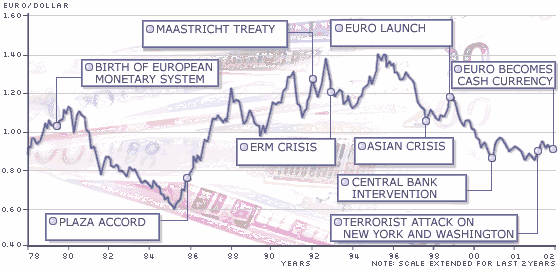Welcome
to Johnbirchall-economist.com!
(History of the
euro)
The euro is the result of years of
debate
The development of a European single
currency goes back to the 1950s.
1957: The Treaty of Rome said a common
European market could increase economic prosperity and help towards
promoting closer ties among the people of Europe
1969: European summit at the Hague makes
a single currency an official objective
1970: The Werner report envisages the
creation of a single currency over 10 years
1970s: The oil crises, economic
divergence and a weak dollar meant only a "currency snake",
tying the currencies of Germany, Denmark and the Benelux countries
together, was achieved
1979: The European Monetary System (EMS)
is created, with the exchange rate mechanism (ERM) defining rates in
relation to the European Currency Unit (ECU), a quasi-currency
representing an average of participating currencies.
1986: Single European Act The Single
European Act, which modifies the Treaty of Rome is signed and comes into
force the following year. It sets up a framework for the Single European
Market by increasing the Commission's powers and introducing qualified
majority voting for a number of issues.
1988: The European Council of Hanover
sets up a committee chaired by Jacques Delors, the then President of the
European Commission, to put forward plans leading to European Monetary
Union
1989: After consideration of the Delors
report, the European Council meeting in Madrid agrees the first of three
stages of EMU will begin in July 1990
1990: Stage one of EMU begins with
narrowing of bands under the Exchange Rate Mechanism and closer
co-operation on economic policy and between banks.
1991: Plans for a single currency by the
year 2000 are agreed under the Treaty of European Union Plans by the 15
members of the European Union in the Dutch town of Maastricht.
Strict rules for those joining are
agreed, including targets for inflation, interest rates and budget
deficits
The UK and Denmark exercise their opt
outs from the stage three of EMU.
1994: Stage two of EMU begins with plans
for creation of European Central Bank and convergence of member states'
economic and monetary policies.
1995: The name "euro" is
chosen for the new currency at the European Council in Madrid.
1997: New UK Chancellor Gordon Brown
announces five economic tests to be assessed before the UK joins the euro.
1998: The European Council agrees that
11 member states - Belgium, Germany, Spain, France, Italy, Ireland,
Luxembourg, the Netherlands, Austria, Portugal and Finland - are ready to
adopt the euro on 1 January 1999
European Central Bank established in
Frankfurt to maintain price stability and set interest rates in the euro
zone.
1999: Stage three of EMU: The euro is
launched as an electronic currency used by banks, foreign exchange
dealers, big firms and stock markets. Exchange rates of the participating
currencies are set and euro zone countries begin implementing a common
monetary policy.
2000: A referendum in Denmark ends with
53% of Danish voters rejecting entry to the euro.
2001: Greece joins the euro
The UK's Labour government, re-elected
for a second term, says it will assess its five tests for euro entry
within two years.
2002: Euro coins and notes become legal
tender and national currencies become obsolete.
Sweden announces plans to hold a
referendum on euro entry on 14 September 2003.
2003: The UK Government says it has
decided the time is not right to recommend euro entry in a referendum.
Chancellor Gordon Brown says he will
return to the issue again early in 2004.


They consist of five criteria, laid out
in the Maastricht Treaty:
-
The
amount of money owed by a government - known as the budget deficit,
has to be below 3% of Gross Domestic Product (GDP) - the total output
of the economy.
-
The
total amount of money owed by a government, known as the public debt,
has to be less than 60% of GDP. The public debt is the cumulative
total of each year's budget deficit.
-
Countries
should have an inflation rate within 1.5% of the three EU countries
with the lowest rate. This was supposed to push down inflation rates
and lead to more stable prices.
-
Long-term
interest rates must be within 2% of the three lowest interest rates in
EU.
-
Exchange
rates must be kept within "normal" fluctuation margins of
Europe's exchange-rate mechanism.
The
UK's five tests
These are the five economic tests on UK
entry to the euro as outlined by The Treasury in 1997.
Convergence
The Treasury sees the first test, the
need for the UK economy to come together with the euro zone economy, as
the "touchstone" towards a successful single currency.
And it says it must converge in a
"sustainable and durable" way.
It says that to be passed, the UK
economy must:
-
have converged with Europe
-
be shown to have converged
-
show convergence capable of being
sustained
-
have sufficient flexibility to adapt
to change and unexpected economic events
In the past, the UK's economic cycle has
been both more volatile than others in the EU, reflecting different
economic policies, oil price rises and German unification.
Are
business cycles and economic structures compatible so that we and others
could live comfortably with euro interest rates on a permanent basis?
This also been affected by differences
in the UK economy such as trade patterns, oil, company finance and the
housing market
Setting out the five tests, the
government said a period of stability - via low inflation and controls on
spending - would be needed in order to promote sustainable and durable
convergence with the rest of the European Union.
Flexibility
The Treasury says the success or
otherwise of the euro depends on business and the workforce being
flexible.
The economy, it says, must have
"the ability to adjust to change".
If
problems emerge is there sufficient flexibility to deal with them?
It says this is because of the
"inevitable loss of domestic control over monetary policy" and
the risk of future economic turbulence.
Firms would need to be flexible in terms
of pricing and margins, and in their business strategy.
Wage bargaining in the labour market
must be "realistic and take account of developments in
productivity".
Employees would need to increase their
skills in order to adapt to change in the job market.
Investment
The Treasury believes that a successful
single currency would:
Would
joining EMU create better conditions for firms making long-term decisions
to invest in Britain?
create an attractive area - with low
inflation and stability - for firms to invest
be a complement to the Single Market,
boosting competition and providing new opportunities for companies
The Treasury says the euro could, if
successful, help to reduce the risk of poor investment performance by
reducing instability.
Investment could be boosted by the
reduction of transaction costs and exchange rate uncertainty, it says.
And more transparent pricing - with
companies able to compare prices between countries much more easily -
could also encourage investment.
But the Treasury says entering the
single currency before the UK economy has sufficiently converged with the
euro zone would discourage investment.
Financial
services
The Treasury says joining the euro would
affect the financial services industry "more profoundly and more
immediately" than other sectors of the economy.
What
impact would entry into EMU have on the competitive position of the UK's
financial services industry?
It says whether the UK joins the euro or
not, the City of London's strengths "should help it to thrive".
The test centres on whether the
introduction of the euro would be advantageous for the sector and whether
the sector is fully prepared for the introduction of the single currency
in the UK.
Employment
and growth
This is the "fundamental"
test, says the Treasury.
Will
joining EMU promote higher growth, stability and a lasting increase in
jobs?
Joining the euro could "enhance
both growth and employment prospects".
But without sufficient convergence and
flexibility, "the resulting turbulence could considerably damage
them".
The Treasury will have to decide as it assesses the
tests the potential effect on jobs and growth from joining the euro.